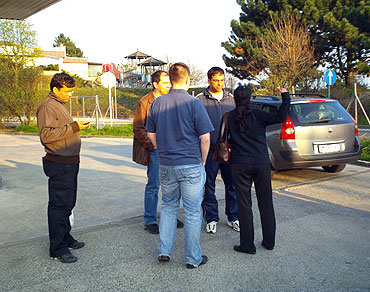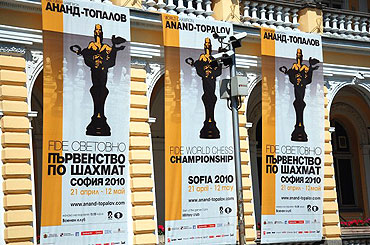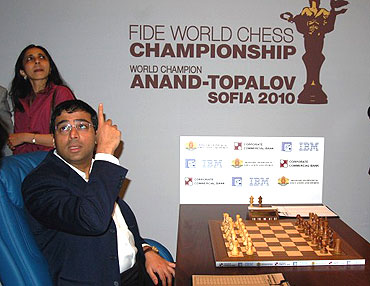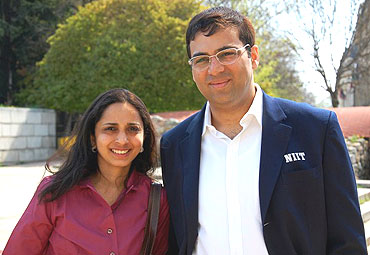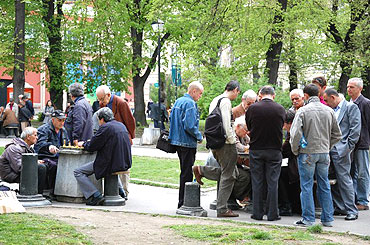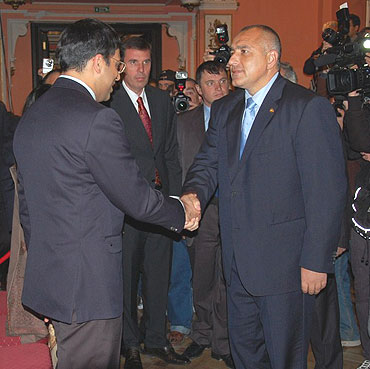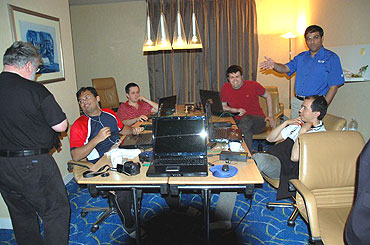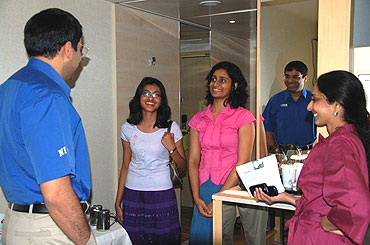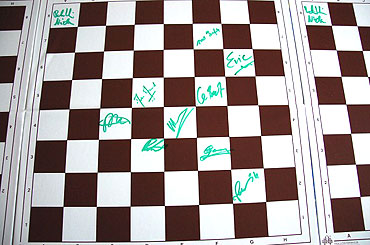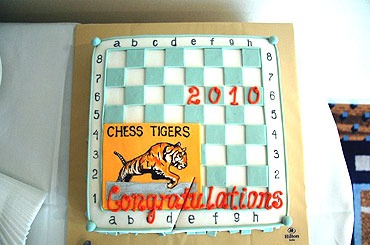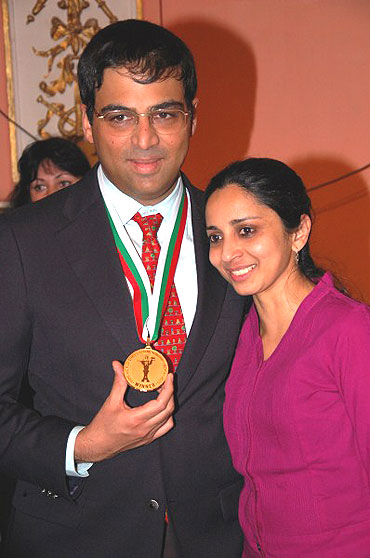 | « Back to article | Print this article |
Anand's preparation relied on 'human cluster'
World chess champion Viswanathan Anand conceded that he and his team were nervous after challenger Veselin Topalov spent a fortune to secure a supercomputer ahead of the World Championship clash in Sophia, which the Indian won 6.5 - 5.5 to retain the crown he won in 2008.
Topalov obtained 'Cluster', which ran the latest Rybka program.
Anand, on the other hand, relied more on what he described as "human cluster", with World No 1 Magnus Carlsen and former World champions Garry Kasparov and Vladimir Kramnik providing generous inputs.
Photographs: Eric van Reem
'We got worried about Topalov's super computer'
Anand conceded that he and his team of seconds were nervous after hearing about Topalov's new acquisition.
"We actually started to get a bit worried when we heard about it," Anand said in an interview on Playchess.com.
"So we had to do something in a hurry...Then the people from Hiarcs (a computer chess program) got in touch. That improved matters quite a bit," Anand said.
According to him, computers are useful, but they have limitations too.
'Working with computers means you stop taking risks'
"It must be good for the player to have good hardware. The problem is that it often doesn't tell you what you want. You want it to find an improvement for White, and it may choose to find it for Black instead.
"It is also insidious -- it can stop you playing your favourite lines because of some obscure problems somewhere.
"I would say computers are very useful -- especially very powerful hardware - but if working with the computer means you stop taking risks it's of course going to kill you," Anand said.
Kramnik had intelligent suggestions
In that respect, human analysis has an edge, he said.
"With humans it is fantastic, because some of the things they tell you, you can almost relate to. You can almost see how it is something you can apply at the board.
"In the last few days, some of the suggestions came from Vlady (Kramnik) -- very intelligent suggestions, with his explanation of why you should do this or that," he added.
'Kasparov has unique way of helping'
"Or sometimes Garry (Kasparov) will tell you a story about the player, and it is some insight which at a critical moment it may help you to choose between two moves and that can be decisive.
"So it is a very, very different kind of help. Of course, these are some of the greatest players in chess, so you can't really ask for more," said Anand.
Carlsen was Anand's sparring partner
Anand also gave credit to World No 1 Magnus Carlsen, who had worked with him before in Bonn and Mexico.
"Sometime in March he got in touch with us, and said that he would be happy to help for a couple of days," Anand told chessbase.com.
"We decided he would come after his tournament in Nice.
"Basically, I had him as a sparring partner. We did check some openings together, but the basic idea was that I would get to play a lot with him," Anand added.
'Carlsen's practical skills were helpful'
"Very few people can simulate a real tournament situation like Magnus can. We played a lot of blitz, and I felt good, because I was able to test a lot of areas I was unfamiliar with before," he said.
"With Magnus you can test almost any position, because he can play almost any position, and play it reasonably well. In that sense his practical skills are very helpful," he added.
Anand's team was kept a secret
No one knew who was on Anand's team of seconds as it was a deeply guarded secret. But he finally made the revelation on Tuesday. The team comprised the same names and minds that worked with him two years ago in Bonn.
GMs Surya Ganguly, Rustam Kasimdzhanov, Peter Heine Nielsen and Radoslaw Wojtaszek and computer expert Eric van Reem were the men who worked behind the scenes.
Anand also trained with Danish GM Anish Giri
Anand also disclosed another famous name that was part of his seconds team: Danish Super GM Anish Giri.
"Anish also did a couple of days of training with me. It was very similar to what I was doing with Magnus - I got to test a lot of things.
"There were a lot of areas I had no practical experience with, like the Catalan which I was playing almost the first time, the Elista ending and so on. Anish also sat and went through that," Anand revealed.
'Toughest championship title'
Last week, in exclusive interview with rediff.com Anand had said that this title was the toughest coming.
"Definitely, this was the toughest match. I have never played a championship where the result was fought till the last game. In some of the earlier matches, the match situation was such that we didn't even play the last game. But this was very unusual.
"Yesterday morning, I had no idea whether I would wake up today morning as a champion or ex-champion, or whether we would be preparing for the tie-break. Anything could have happened," Anand said, just after winning the World Championship.
'Aruna was suffering too'
Acknowledging wife Aruna's contribution towards his success, Anand said he thought Aruna faced more stress than him.
"By the last day it wasn't clear who was suffering more, her or me. It's tough -- at least the seconds get to stop seeing me for a while, but when I woke up I was really tense and she could see that and it affected her as well," Anand said.
Aruna had also said, in another interview with rediff.com, that the final was the most difficult to watch.
"I would say, the final game was the most difficult to watch. His previous World championship wins were very smooth.
"We kind of knew he was going to win. Here you knew anything could happen. If Anand had lost, it would have been over," she added.
'We did not know how to react'
"But in the last one hour into the game we all knew Anand was winning. Even then you tell yourself something can go wrong. You didn't want to be too optimistic. Finally, when the handshake happened, we did not know how to react."
"When the team came into the playing hall I really felt happy. The team did not leave the hotel during the whole match. Only when he won did they come over," Aruna said.
